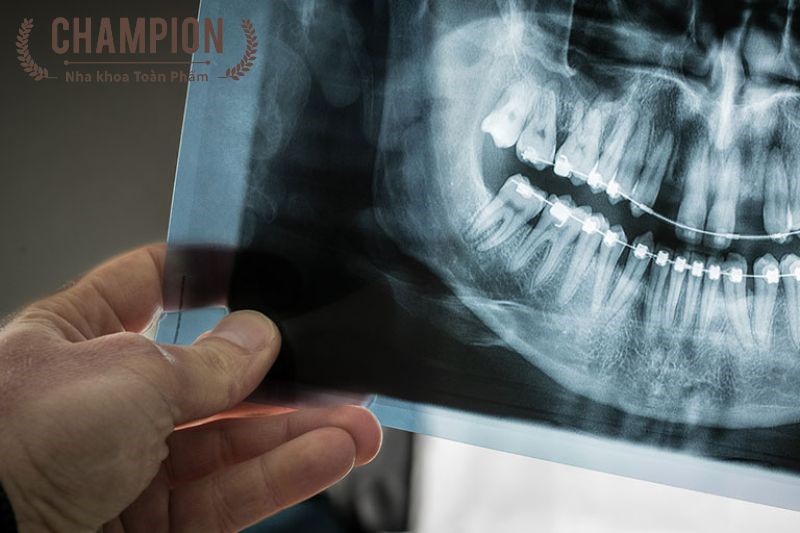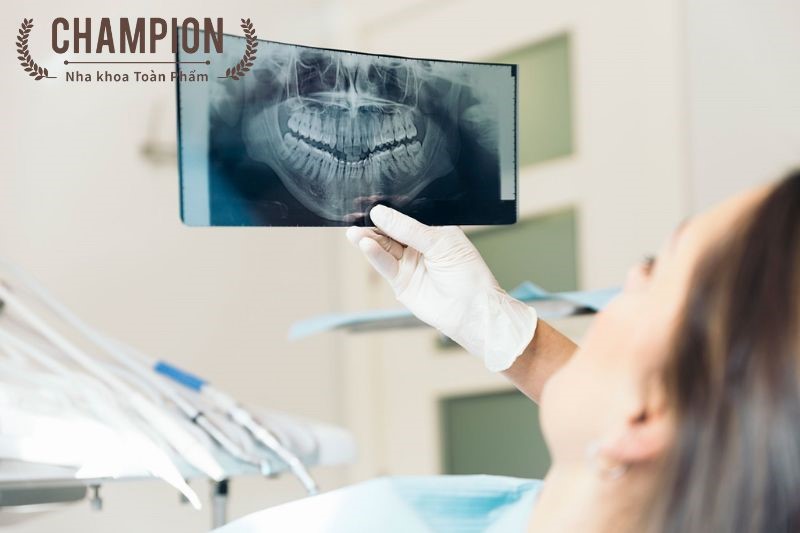Dental X-ray is a method that helps dentists evaluate the health of your teeth and gums. These X-rays are used with low levels of radiation when taking images of the inside of your teeth and gums, which can help your dentist identify issues that may not be visible to the naked eye, including cavities, decay, and impacted teeth.
The question of whether dental X-rays are harmful is a common concern. However, despite the seemingly complex nature of the procedure, they are actually very common and essential tools in dentistry.
Why should you get dental X-rays
The question of whether dental X-rays are harmful or not is always a concern for many patients. However, let's first understand a little about this type of imaging. Dental X-rays are quite common, and dentists often need to take them regularly to monitor the patient's condition and disease. They also help in tracking dental treatments. However, dentists will rely on several factors to determine whether or not to take X-rays frequently. These factors include:
- The age of the patient.
- The current oral health of the patient.
- The symptoms of the disease.
- The patient's medical history.
If you are a new patient, you may need to have dental X-rays taken. This will give the dentist the most detailed view of your oral health.
Dentists may need to take dental X-rays of children more frequently than adults to monitor the development of their adult teeth. This is important because it can help dentists determine whether or not to extract baby teeth to prevent complications. It can also help prevent adult teeth from growing behind baby teeth.

The risks of dental X-rays
Answering the question of whether dental X-rays are harmful or not, although dental X-rays involve radiation, the level of exposure is low, making it safe for both children and adults. In addition, since the X-rays have been captured on film by the dentist, the radiation dose is virtually nonexistent. However, when taking the X-ray, dentists will wear a special apron to cover the entire body and limit the exposure to the maximum.
Pregnant women are a special case that should not be exposed to X-rays. Radiation is considered unsafe for both the fetus and the expectant mother.
What to prepare before getting dental X-rays
There is no special preparation needed for dental X-rays. The only thing you want to do is to brush your teeth before the appointment. This creates a cleaner environment for the workers and the dentist. X-rays are usually taken before cleaning.
At the dentist's office, you will sit on a chair with a lead apron across your chest and thighs. The X-ray machine is placed near your head to capture images of your mouth.
Dental clinics have a separate room for X-rays in some cases.

Types of X-rays
There are several types of X-rays commonly used in dental imaging. Each type involves taking an image of a specific position.
Bite-wing X-rays: Your dentist will have you bite down on a special piece of paper to see how your teeth fit together using the bite-wing X-ray technique. It is typically used to check for cavities between teeth (interproximal decay).
Occlusal X-rays: This is performed when your jaw is closed to see how your upper and lower teeth line up. It can also detect any anatomical abnormalities in the roof or floor of your mouth.
Full mouth series X-rays: This technique involves taking X-rays of all your teeth in one go.
Panoramic X-rays: With this type of X-ray, the machine rotates around your head. Your dentist can use this technique to check your wisdom teeth and create a treatment plan accordingly.
After taking dental X-rays
Immediately after taking the X-ray images, the doctors will be the first to view the film directly and check for any abnormalities on the patient's teeth. From there, they will decide on the appropriate treatment plan.
If your dentist discovers issues such as cavities or decay, the doctors will discuss the most suitable treatment options for the patient. If your dentist does not find any issues, you can proceed with the usual check-up and cleaning steps with peace of mind.

>> See more: Global oral health status report from WHO
Conclusion
As mentioned above and to answer the question of whether dental X-rays are harmful or not, the answer is no, but there are still some notes to consider. Like brushing and flossing, dental X-rays are often an essential part of overall oral health. Depending on your age, health, and insurance coverage, X-rays may be taken once or twice a year. Be sure to keep your appointments and see your dentist sooner if you experience pain or any other issues. You can contact us directly at the addresses below for the earliest support.
Vietnamese & English: (028) 5411-2295
中文: (028) 5411-2297 172 Nguyen Luong Bang, Tan Phu Ward, District 7, Ho Chi Minh City.
Fanpage: Champion Dental Clinic 牙科診所
Zalo: Champion Dental Clinic
Youtube: Champion Dental Clinic 牙科診所
 Champion Dental Clinic
Champion Dental Clinic



